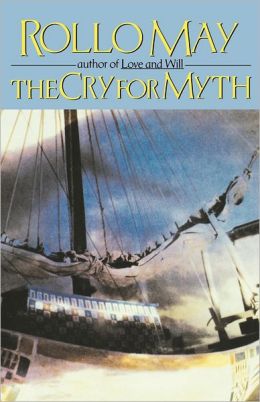
Rollo May (1909-1994) was a highly influential American existential psychotherapist and a skillful author. His many books, accessible to laymen, were highly influential through the 1970s and 1980s. They’re still well worth reading. May shares mind-blowing insights that reveal the inner workings of the human mind.
In The Cry for Myth May tackles a subject dear to the Jungian heart – the critical role that myths play in the structure of the psyche and the collective conscious. Although May wasn’t a Jungian, he certainly understood the value of myth in personal and sociological contexts.
The first few chapters of the book discuss the relevance of myth, and how they work on a conscious and subliminal level. He states: “The myth is a drama which begins as a historical event and takes on its special character as a way of orienting people to reality.” (p 26) Myths offer patterns of foolishness, wisdom, and outline the steps toward moral and heroic behavior. People that exist in a society without a mythology exist in a vacuum of ethical rootlessness, since “myth safeguards and enforces morality.” (p 60)
May gives a succinct and helpful analysis of the Oedipus trilogy in Chapter 5. There are several examples of mythic models in modern drama, film, and fiction. Part II “Myths in America” is an eye-opening expose on the types of myths Americans have absorbed into the national consciousness – the lone stranger or the lonely pioneer, Horatio Alger stories, and the Great Gatsby. May’s analysis of the myth of self-sufficiency hits home with a vengeance in the Tea Party era.
Part III “Myths of the Western World” is an examination of Dante’s Divine Comedy, Peer Gynt, Briar Rose (more commonly known as Sleeping Beauty), and finally, the legend of Doctor Faustus. The Faustus story has been treated by three authors – Marlowe, Goethe, and Thomas Mann. Each puts a more contemporary spin on the tale of selling one’s soul to the Devil for great earthly powers. May does an excellent job of keeping his ideas in play. A helpful index is appended at the end of the book.
Rollo May made psychology very accessible to the layman. Anyone can read his books and benefit from them. Although “Love and Will” contains some post-sexual revolution thinking and behaviors that are dated, there’s still a remarkable amount of timeless wisdom. He was singularly successful at peeling away the layers of personality and behavior to find the meaning behind who we are and what we do. “Freedom and Destiny” and “The Courage to Create” are my two favorites.
All of his books are highly recommended (see below the review for a list). This author should not be forgotten!
~review by Elizabeth Hazel
Author: Rollo May
WW Norton & Company, 1991
pp. 320 pages, $17.17 (new from Amazon)
Other books by Rollo May include:
Love and Will
Freedom and Destiny
The Courage to Create
Man’s Search for Himself
Power and Innocence
Psychology and the Human Dilemma
The Discovery of Being
Existence (with Ernest Angel)
The Meaning of Anxiety
